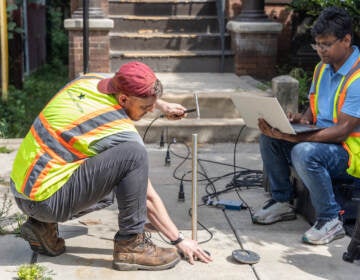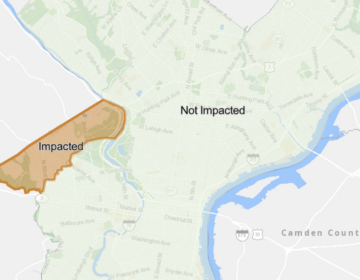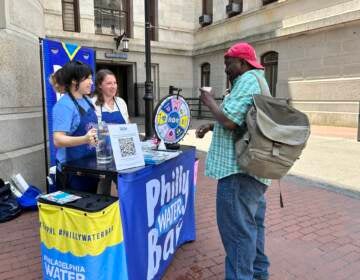Philly’s tap water is safe. Now there is a bar to prove it.
Philly Water Bar will open every Thursday this summer, from noon to 1 p.m., in the courtyard at City Hall.
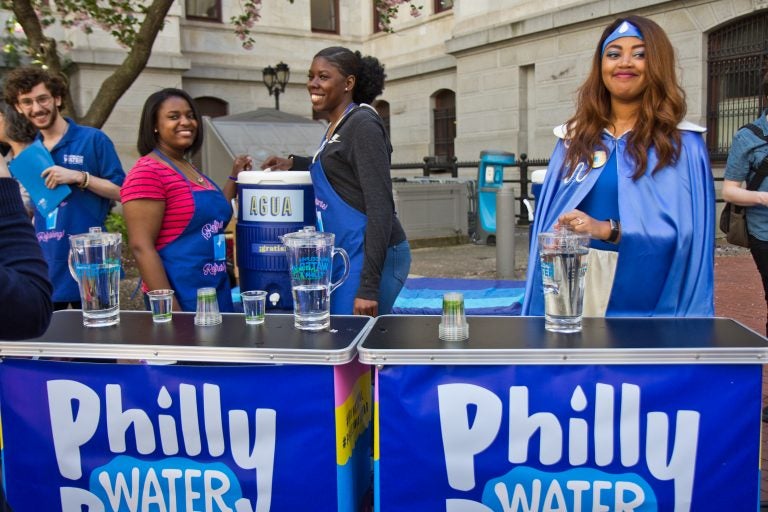
The Philadelphia Water Bar will be open at City Hall every Thursday this summer. (Kimberly Paynter/WHYY)
This article originally appeared on PlanPhilly.
—
The sun was shining, the salsa music enticing, and Katrina Williams was thirsty when she saw the pitchers full of cold water on a table.
So she came forward and accepted a glass full — even after hearing it was tap water.
“It tastes good,” Williams said in disbelief.
Williams found her surprisingly refreshing drink at the Philly Water Bar, a Philadelphia Water Department outpost that opened for business Wednesday in the courtyard of City Hall.
The pop-up will open every Thursday this summer, from noon to 1 p.m., giving away H20 straight from the tap and reusable bottles.
Its mission goes beyond quenching thirst — it wants to convince Philadelphians that they don’t need to buy bottled water; tap water is safe, free and doesn’t generate plastic waste. About 43 percent of Philadelphians drink from bottles at home because they don’t trust the H20 that flows from the city’s faucets, according to a study done by University of Pennsylvania researchers. Most are people of color and low-income residents.
Williams, who is African American, is one of those Philadelphians who chooses to buy water. She’s not sure when she started drinking from bottles, but now it’s a routine — she would never give her granddaughter water from the tap. The $30 a month she spends on water encased in plastic is worth it, she said. The only way she would trust the city’s water is by testing it herself.
But the sample she tried on Wednesday got her attention.
“It’s good,” Williams said, taking another sip. “I can’t believe that this is Schuylkill punch. We used to call it Schuylkill punch, you know. So I don’t know what it is, but it tastes real good.”
Water Department officials assured the water from the bar was coming directly from City Hall’s tap — a perfect mix of Schuylkill and Delaware river water, since that’s where the watersheds divide.
The city says it provides safe, reliable and high-quality drinking water from source to tap. Tap water is tested for nearly 100 compounds daily, and it outperforms national standards set by the Environmental Protection Agency (EPA), according to PWD’s quality report. Yet, half of all Philadelphians with a high school diploma or less and more than half of those making less than $20,000 a year drink water from bottles in their homes, according to a survey by ImpactED at the University of Pennsylvania. The survey also found that 56 percent of black and 40 percent of Latino residents choose bottles over their home taps.
“I grew up in Puerto Rico and I never had tap water until I moved to Philadelphia,” said Tiffany Ledesma, a Water Department staffer. “There’s a cultural association with that, there’s distrust of government. And so, we recognize that.”
Earning the trust of people coming from countries or cultures where water from the tap can’t be safely consumed will take time, she said.
“We have to be patient, repeat the message over and over. It takes time to build trust, and you really have to be patient with people that are not used to doing something different, like drinking tap water,” Ledesma said.
Take Robert Avilés, a City Hall passerby who rejected a glass of tap water from the Water Department’s bar. He said the water from the tap is contaminated and that water from the store is cheap enough and clean.
“I’m not drinking it, it’s contaminated,” Avilés said. “I’m sorry, it is. Nothing will convince me.”
But is bottled water safer? Water Department’s director of laboratories, Gary Burlingame, says there is no guarantee. Bottled water is regulated by states and the U.S. Food and Drug Administration; Its safety depends on a range of factors from the quality control of each company, to where the water has been stored. The International Bottled Water Association has a code of practice for producers.
It’s hard to compare bottled water being produced in batches with tap water that’s continuously flowing, Burlingame said. “But it has been said that tap water has more stringent requirements, and a lot more stringent requirements for monitoring the water on a daily continuous basis, than bottled water does.”
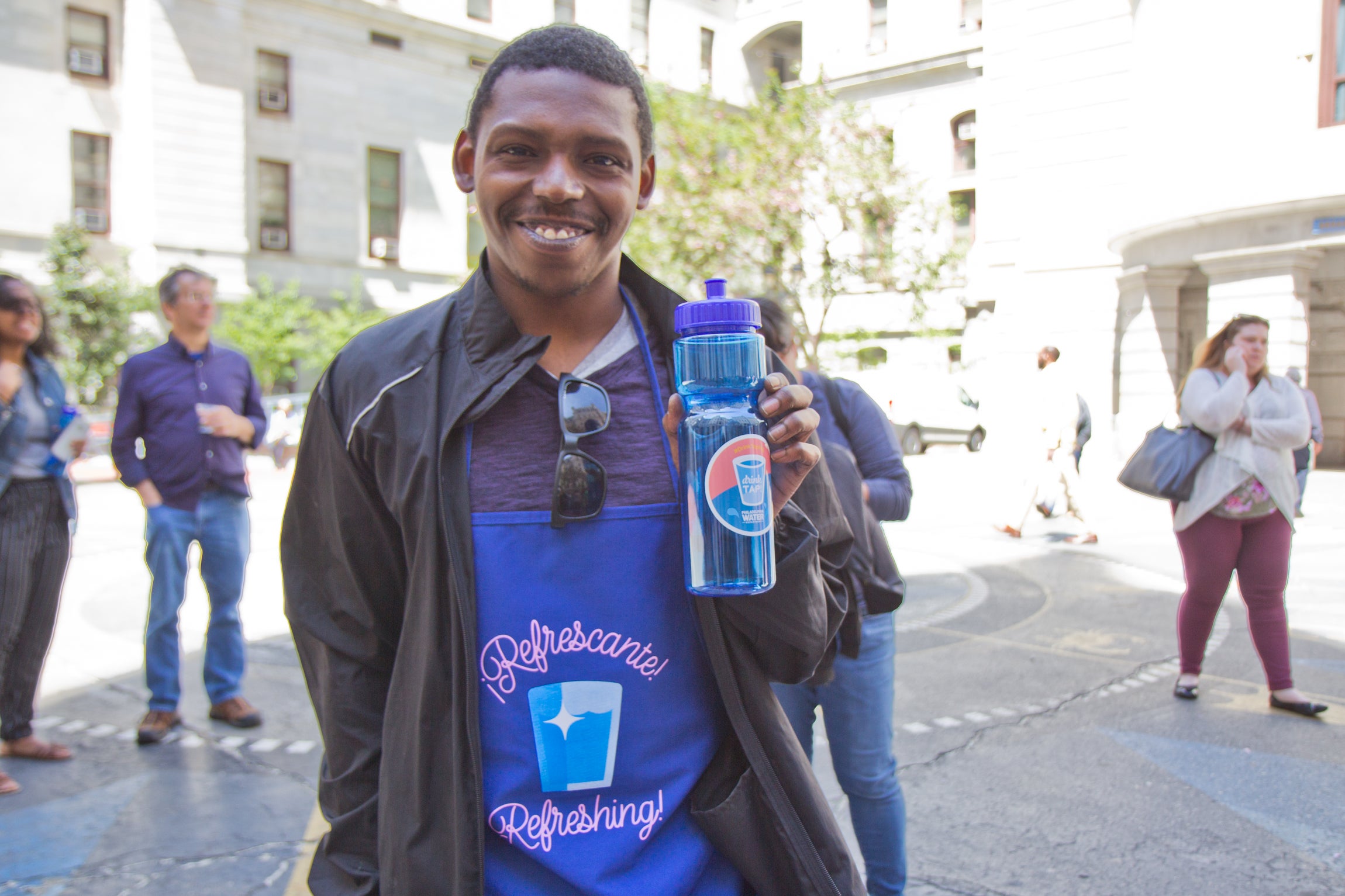
The tap water campaign — led by a coalition including ImpactED at the University of Pennsylvania, the Philadelphia Water Department, PennEnvironment, and the Water Center at Penn — is working with 25 community ambassadors to get the word out on water.
“We grew up with tap water. I’m drinking it, my nephews are drinking it, and we’re all pretty healthy,” said Leon Sanford, one of the ambassadors. “The water in the city is always tested, PWD has it on its website, and we have places where you can come out and they can test the water for you.”
But Derek Hicks, a 32-year-old Kensington resident, worries about lead. The Flint water crisis in 2014 left many distrusting their public water utilities. Plus, Hicks said, the same Water Department has said that lead pipes can contaminate tap water.
“Certain water contains lead, and lead is hazardous for your health,” Hicks said.
Water Department’s Burlingame said that’s correct: Philly’s water is safe, but not free of risk. Just like driving or eating outside of your home, he said.
“As a scientist, I cannot say that water is 100% free of risk, 100% of the time,” Burlingame said.
But the biggest risk doesn’t come from the water produced by the city, he said. The risk comes from the plumbing — if water goes through lead pipes, the water could end up containing lead. Homes built before 1950 may have a lead service line connecting their faucets to the city’s water mains. The city can’t tell which houses those are, because it doesn’t keep an inventory of private property.
“The lead doesn’t come from the water that we treat, the lead comes from the plumbing,” Burlingame said.
Part of the campaign, officials said, is to inform residents about lead in the water, spread information about how to check pipes and on the city’s programs to replace them.
WHYY is your source for fact-based, in-depth journalism and information. As a nonprofit organization, we rely on financial support from readers like you. Please give today.




